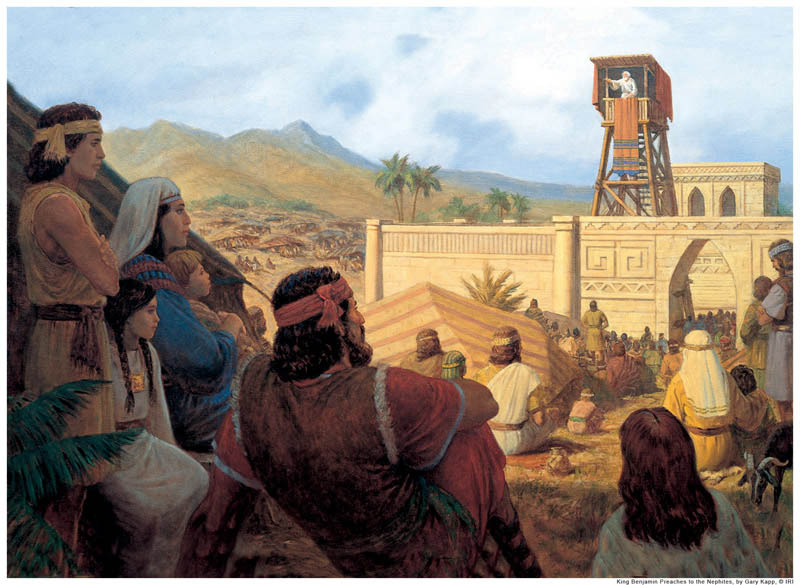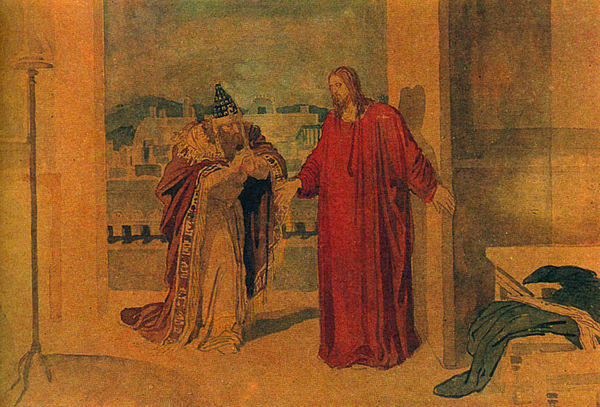Question
Gramps,
I can’t help noticing that the people in the scriptures are so blessed. They get what they want with no special formula. Infertile women are blessed with children (on top of having great husbands). People reach out and get healed of things unheard of. People who commit grievous sins move straight up to the top. Some get visions. Everyone fawns over these miracles, saying they should give us hope. But how? All it does is scream privilege either pre-mortally or by association.
Sister Taylor
Answer
Dear Sister Taylor,
I knew a woman who, like many, grew up believing what the world had to say about “the God of the Old Testament” – that He was cruel and vengeful. Then one day she was reading Hugh Nibley, who said that this simply wasn’t so, that the God of the Old Testament is the same loving and merciful God the Church taught. So she went to look for herself and discovered what she had never seen in the Old Testament in her prior readings: mercy and generosity overflowing, a God who loved His people and all mankind.
Is it possible, Sister Taylor, that someone (or modern societal rhetoric) has “primed your pump”? That you are subconsciously seeing only what someone has told you is there. Might it be possible that if you go back and look for it, you’ll find that the people of scripture have worked hard to build their faith and obedience so that the Lord could trust them to carry out His work? Might you find that they didn’t have an easy time of it, but went through all the various trials, sorrows, and pains that are common to mankind? Might it be that we can learn from them how to increase our own faith and obedience, even in the midst of trials?
Let’s discuss some perspectives and principles, and then address some of your examples.
Perspective
The scriptures usually talk about a very few specific individuals. We need to be careful not to assume that everyone in the time period of the scripture volume in question had the same types of experiences (Luke 4:25-27). The writers of scripture (usually prophets), record exceptional events designed to support faith or discourage wickedness. Rarely do we hear about the Shiblons (Alma 38, the middle son who did his duty without drawing attention to himself). Shiblon could be likened to most of us – we come to our meetings, serve in our callings and assignments, and strive to keep our covenants, but are largely unremarkable1. It’s important to note, however, that even Shiblon suffered persecution. We’ll come back to that idea. For now, the point is to remember that scriptures are generally not about the rank and file membership.
This means that you’re going to be reading about leaders of the Church and the nation. You won’t be reading about Captain Moroni’s wife or Nephi’s third son (if he even had a third son). You’re reading about the people whose stories make the doctrinal points that the Lord guided the authors to teach.
We also need to remember that, especially with the Book of Mormon, time is compressed. What I mean by that is that one chapter can abridge decades! It can seem as if someone did go from “most vile sinner to best prophet ever” in the blink of an eye. But this isn’t the case. A careful reading will show that there are years compressed into the verses.
Finally, keep in mind that we don’t see all the details of anyone’s life, nor do we see much of their growth, repentance, or mistakes. We see snippets from their lives that teach us the valuable lessons we need to know. That their lives may seem blessed beyond measure in scripture doesn’t mean they never dealt with the normal trials of life – quite the contrary, I think. I’ll show some hints (like Shiblon above) when we get to the examples.
Principles
One principle to remember that can help to inform our understanding of scripture is that God is “no respecter of persons” (D&C 38:16, Acts 10:34) and “all are alike unto God” (2 Nephi 26:33). God is “the same yesterday, and to day, and for ever” (Hebrews 13:8), so we need not think that the rules have changed.
We believe in a God who knows “the end from the beginning” (Abraham 2:8) and before whom “all things are present” (Doctrine and Covenants 38:2). From this, we can have faith that whatever unfairness there may seem to be in mortality, God is perfectly loving, perfectly merciful, and perfectly just. Through Christ, all can receive “the riches of eternity” (Doctrine and Covenants 38:39).
We are told over and over again in scripture not to seek for “riches” or “the vain things of the world” (3 Nephi 6:15). We must be careful not to equate worldly prosperity with Godly favor. That righteous societies often attain prosperity does not mean that prosperity is always a sign of righteousness. When we start to focus our attention here, we can miss our own blessings, and the valuable lessons scriptures have to teach, as well as the reality of what happened to the individuals spoken of in scripture. True prosperity is found on the covenant path. (See also Matthew 6:33, Luke 12:31; 3 Nephi 13:33; Doctrine and Covenants 11:23 regarding proper focus and sequence.)
Blessings are attained through obedience (Doctrine and Covenants 130:20-21, Doctrine and Covenants 82:10), after tribulation (Doctrine & Covenants 58:4), after study (Doctrine and Covenants 9:7-8), after the trial of our faith (Ether 12:6), according to the will of the Lord, to bring about His purposes, and for our good (Doctrine and Covenants 122:7). All can have the privilege of receiving revelations and blessings, if they exercise sufficient faith and obedience (see Alma 13:4).
Further, blessings are often made conditional on our seeking or asking for them with real intent (Matthew 7:7-11, Doctrine and Covenants 42:61, Doctrine and Covenants 46:8-9, Bible Dictionary entry on prayer). The Lord is willing to reveal Himself to those who diligently seek Him (Doctrine and Covenants 88:83, 101:38), James 1:5-6).
You used the phrase “no special formula”. From the above, I hope you see there is a formula. Even if a scripture story doesn’t explicitly detail how the formula was applied, you can rest assured that it was followed, because God is a God of order.
Examples
Let’s look at some examples.
Infertile women and great husbands
Sarah and Abraham. I invite you to read again the Book of Abraham and Genesis 11-25. Therein you will learn many key points, including:
- Abraham’s family were idolaters (someone whose family has left the Church could perhaps relate to this trial).
- Abraham was taken to be sacrificed by an idolatrous priest!
- See below for the significance of being childless in this culture.
- Abraham and Sarah were in danger from Pharaoh (perhaps people today know what it feels like to fear political authorities).
- Abraham had to fight at least one war (surely this was trying for him and Sarah).
- They had family contention with Hagar as a second wife.
- And the Lord asked Abraham to sacrifice his son Isaac on an altar! Has the Lord ever asked you to do something so difficult? Were you willing to do it? Did you follow through?
In the very beginning of the Book of Abraham, he says that he sought after the blessings of the fathers (meaning the promises of the priesthood) and that he was “a follower of righteousness, desiring also to be … a greater follower of righteousness”. I testify that as we develop this desire and act with faith and obedience, God blesses us. The details of how will vary. We aren’t all called to head a dispensation of the gospel, but that doesn’t mean we cannot seek after God’s blessings.
Elizabeth and Zacharias. Do you suppose that God would have chosen to send John the Baptist to just anyone? Or is it reasonable to assume that this elderly couple were living exceptionally righteous lives, so that they could be trusted to teach John what he needed to learn? Do you suppose it’s easy to live an exceptionally righteous life, especially childless, in a culture where having children was not only a symbol of God’s favor, but was critical to your own survival? I think there was indeed a “special formula” here. That the story doesn’t mention it doesn’t preclude it. Further, I can see nothing in scripture to suggest this couple was any more privileged than any other priest and his wife. What they were, however, was worthy and willing.
I encourage you to read their story in Luke 1, looking both for the difficult things they did, such as “walking in all the commandments and ordinances of the Lord blameless.” I don’t know many people who can claim to be “blameless”. Ponder their situation and how difficult it must have been for them, year after year of their younger lives, not to be blessed with children while all around them were. Think of it from the perspective of their culture, not ours.
And as for “great husband,” – clearly he was, but not great enough to avoid asking for a sign and being made unable to speak until the child was born. Just because scripture doesn’t always tell us about someone’s weakness doesn’t mean they don’t have any.
Reach out and get healed
I presume this is in reference to the woman with an issue of blood. I encourage you to read the accounts in Mark 5 and Luke 8 (Matthew’s account is too short). Ponder these questions: What would it be like not only to have an “issue of blood” for twelve years, but to be cast out of society, considered unclean and unable to approach anyone? What would it be like to spend every penny you have on physicians and not one of them able to help you? Do you have sufficient faith that merely touching the hem of the Savior’s clothing would heal you? If so, you are blessed indeed. This was no simple, mindless act on her part. This woman suffered for twelve years, went broke for nothing, and developed faith stronger than most of us can claim. She was not privileged any more than the rest of us. But like Abraham, she sought a blessing with all her heart and all her faith.
Commit grievous sins and move straight to the top
I’m guessing you’re referring to Alma the younger, who went about trying to destroy the Church of God and later ended up its prophet? Perhaps you’re also considering the sons of Mosiah. I’m not going to recount everything Alma and those sons went through, but I will ask, are you willing to dedicate 14 years of your life to minister to the enemies of your people? Here’s Alma the younger’s description of what he went through:
Mosiah 27:28 Nevertheless, after wading through much tribulation, repenting nigh unto death, the Lord in mercy hath seen fit to snatch me out of an everlasting burning, and I am born of God.
29 My soul hath been redeemed from the gall of bitterness and bonds of iniquity. I was in the darkest abyss; but now I behold the marvelous light of God. My soul was racked with eternal torment; but I am snatched, and my soul is pained no more.
Does this sound like privilege? How many of us know what it’s like to repent “nigh unto death”?
Visions
There are so many prophets who saw visions. Hopefully, by now you’ve begun to see a pattern. If you study Church history, you can see just how much Joseph Smith and his family suffered. If you study scripture, you will see that prophets rarely have easy lives – Lehi was nearly killed for his teachings, and had to deal with the constant rebellion of two of his sons, along with all the hardship of traveling to the promised land. And the list goes on.
I think it would be harder to find someone in scripture who didn’t work hard and suffer before receiving blessings from God.
More Examples
I would encourage you to study the lives of a few more Book of Mormon prophets, looking specifically at all they had to endure.
Nephi endured the sort of hardship most of us would run from, and yet he stayed faithful to God and even optimistic through all his trials. Like Abraham, he sought more. For example, instead of being content with believing the vision his father saw, Nephi sought further understanding directly from the Lord. I testify that this is a true pattern. While it is good to believe in the words of prophets, it is better to seek divine confirmation and greater understanding, with the intent to act in harmony with what we receive.
Compare King Benjamin (righteous, served his people, didn’t burden them with taxes) to King Noah (wicked, lived off his people’s work). Again, this sets a pattern. Instead of taking advantage of whatever position the Lord blesses us to be in, we must look for how that position enables us to serve others, and by so doing, we will serve God and invite greater blessings into our lives.
The brother of Jared was chastened by the Lord for three hours. I don’t know about you, but I’m not anxious to enjoy that privilege (though I should be). Yet, by accepting chastening and changing his behavior, the brother of Jared increased in faith to the point where the veil was parted for him. I testify that we do not have to be a prophet for this to happen, but we do have to have as much faith and obedience (Ether 4:15).
I could keep going. My point is, when we read about these people, they have weaknesses, trials, suffering, and triumph. They are there not to discourage us, as if we could never be so faithful or endure so much, but to teach us how to be so faithful, and how to endure our own trials, and how to approach God for greater knowledge. Which brings us to the ultimate example.
The Ultimate Example
If ever someone deserved not to suffer anything, because He committed no sin and did “always those things that please” the Father (John 8:29), it’s Jesus Christ. And yet He suffered more than any of us. He taught us by His example that we are not here to receive, but to give (Acts 20:35), and that whosoever would be greatest must become the servant of all (Matthew 20:27, Mark 10:44, Luke 22:26, John 13:16). And perhaps His ultimate lesson to us, demonstrates that it’s not about our privileges, but about our sacrifice:
John 15:13 Greater love hath no man than this, that a man lay down his life for his friends.
and
Matthew 16:25 For whosoever will save his life shall lose it: and whosoever will lose his life for my sake shall find it.
I submit that, like Joseph Smith and the martyred apostles, those who received the greatest blessings recorded in scriptures also made the greatest sacrifices, living and giving their lives in the service of others.
Yes, the scriptures are full of stories of miracles, rescues, visions, and victories. They’re also full of heartache, suffering, and loss. Through them, we see examples both of those who lost all through wickedness and, more importantly, those who remained faithful no matter what. Our goal is to learn to be faithful no matter what.
The scriptures also testify that Christ is there, with open arms, longing to receive us as we come to Him “with full purpose of heart” (2 Nephi 31:13).
Long ago, Elder Maxwell said:
The pattern of calling, blessing, expanding, reassuring, and endowing are reflective of the generosity as well as the gentleness of God our Father and his son, Jesus Christ!
Astonishingly, to those who have eyes to see and ears to hear, it is clear that the Father and the Son are giving away the secrets of the universe! If only you and I can avoid being offended by their generosity.
I testify that their offer is available to all who will humble themselves and follow the patterns mentioned above for receiving blessings and revelation from God. I testify that the scriptures teach us how to draw closer to Christ and learn of Him. I challenge each of us to follow President Nelson’s counsel to spend more time in the house of the Lord. I also encourage us to spend more time in the Book of Mormon, to receive the guiding influence unique to that book.
I pray this helps, Sister Taylor, and that you can find the stories in scripture more encouraging as you continue to study.
1For a very uplifting talk praising those of us who go about doing our duty without fanfare, please see “In the Path of Their Duty“, by Elder David A. Bednar.
Gramps










